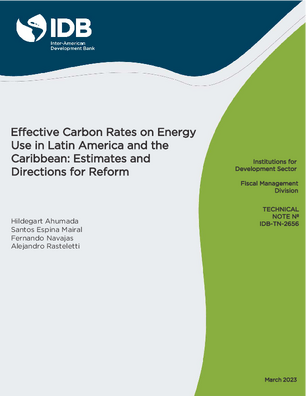Effective Carbon Rates on Energy Use in Latin America and the Caribbean: Estimates and Directions of Reform
Date
Mar 2023
This paper estimates effective carbon rates (ECRs) on carbon dioxide (CO2) emissions from energy use for 18 Latin American and Caribbean (LAC) countries. We follow a methodology developed by the Organization for Economic Co-operation and Development (OECD) as this allows us to compare ECR estimates for LAC countries with those for other countries in other regions. We also adapt the OECD methodology to assess the effect of energy subsidies on ECRs. The results obtained indicate that ECRs were low in LAC countries in 2018. On average, LAC countries priced carbon emissions from energy use at 24 euros per ton of CO2 equivalent (EUR/tCO2e) emissions, while the average pricing in OECD countries was 41 EUR/tCO2e. When considering energy subsidies, the average ECR in LAC falls to 17 EUR/tCO2e. The difference in average carbon pricing observed between LAC and the OECD is, for the most part, explained by lower excise taxes in LAC and, to a lesser extent, to few LAC countries having carbon taxes and the lack of tradable carbon emission permit mechanisms. We also find a large heterogeneity of ECRs across LAC countries as well as across sectors within countries. ECRs are the highest in Costa Rica and the lowest in Ecuador. At the sector level, ECRs are on average the highest in the road transport sector and the lowest in the electricity sector and in the residential and commercial energy use sector. These differences stem mostly from the different taxation of the different energy products. The ECR estimates suggest that countries willing to introduce carbon pricing reforms must pay particular attention to reducing fuel energy subsidies and to increasing ECRs in sectors other than road transport, as these sectors constitute a large share of carbon emissions and are virtually untaxed.




